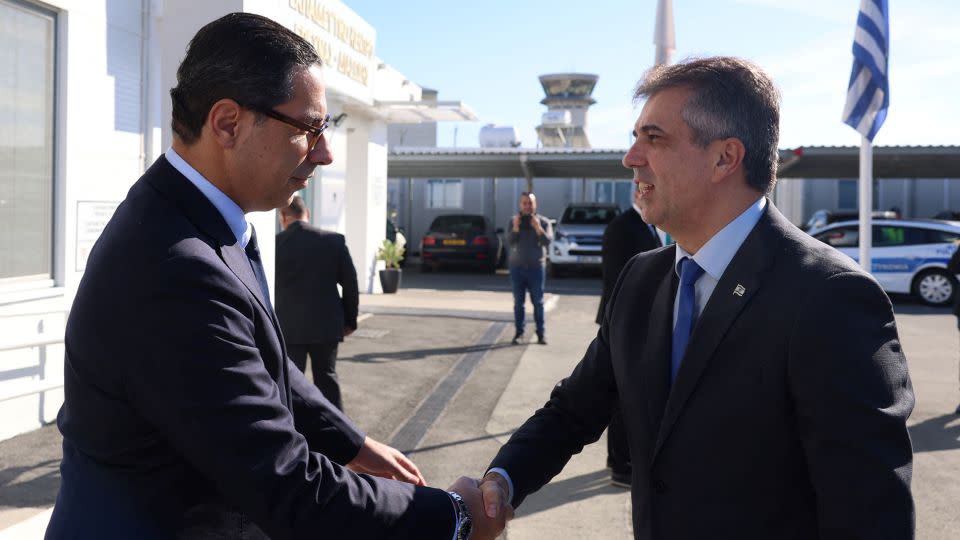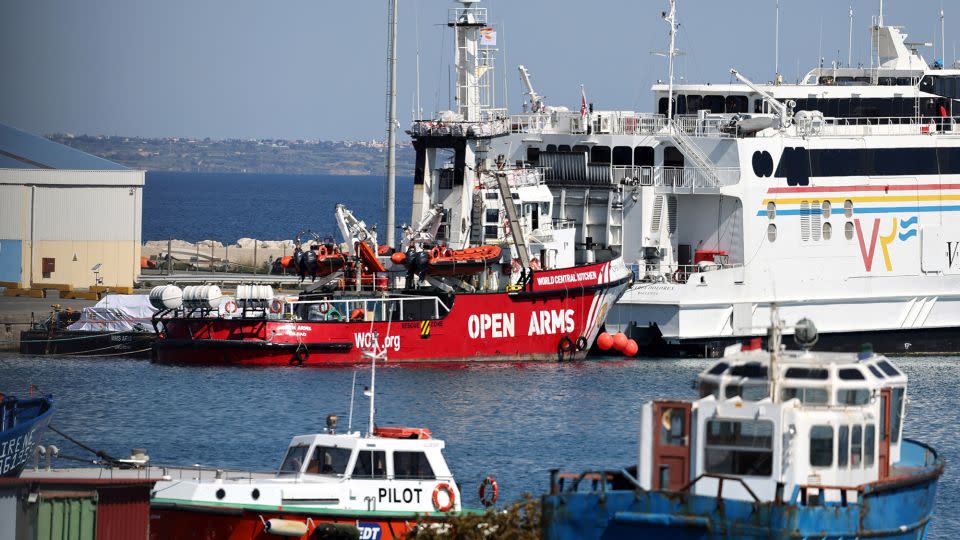Why Hezbollah is threatening this tiny European country
In a fiery speech Wednesday, Hezbollah leader Hassan Nasrallah singled out nearby Cyprus, threatening to target the small Mediterranean island if it aids Israel in a potential war between the Lebanese militant group and Israel.
“Cyprus will be part of this war too” if it opens its airports and bases to Israeli forces, the leader of the Iran-backed militant group said in a televised speech Wednesday, a day after Israel warned that the prospect of “all-out war” in Lebanon was “getting very close.”
Responding to the comments, Cypriot President Nikos Christodoulides denied being involved in the war.
“The statements are not pleasant, but they do not correspond in any way to what is being attempted, to present an image that Cyprus is involved in the war operations. In no way whatsoever,” he said, adding that lines of communication are open with the Lebanese and Iranian governments.
While experts say war between Israel and Hezbollah remains unlikely, the very mention of Cyprus adds a new dimension to the Israel-Hamas conflict in Gaza. It risks drawing a European Union nation into a war that has already spread across the Middle East and puts the spotlight on Cyprus’s ties with Israel.
Here’s what we know.
Why is Cyprus’ location important?
An island in the Eastern Mediterranean located on a geopolitical fault line between the Middle East and southern Europe, Cyprus is geographically much closer to the conflicts in the Middle East than it is to European power centers.
The island is twice the size of the US state of Delaware, and it is split into two parts: a Greek-speaking southern part known as the Republic of Cyprus, and a Turkish-speaking region known as the Turkish Republic of Northern Cyprus. The island’s divide reflects the rivalry between regional foes Greece and Turkey. Most of the international community only recognizes the sovereignty of the Greek part of Cyprus, and that was the nation Nasrallah’s threats were directed at.
The Republic of Cyprus is a member of the EU but not of the NATO defense alliance that obliges member nations to come to each other’s defense in case of attack. It is home to around 920,000 people, with Nicosia as its capital.
How close are Cyprus’ ties with Israel?
Diplomatic relations between Cyprus and Israel started in 1960, following the island’s independence from British colonial rule, but Cyprus didn’t open an embassy in Tel Aviv until 1994. Relations went sour in the 1980s and 1990s over issues including Israel’s close ties with Turkey and the Arab-Israeli conflict, in which Cyprus sided with Arab states and supported Palestinian statehood.
Ties bounced back in the late 1990s and 2000s, as Israel began turning to the Eastern Mediterranean for economic partnerships, especially after the discovery of natural gas in the region. Experts say Israel has also looked to Cyprus as a partner to thwart regional threats, particularly from Turkey and Iran-linked groups.
Israel has in recent years used Cypriot territory to train its troops on possible war with Hezbollah. Cyprus’ terrain is similar to that of Lebanon, the Israel Defense Forces (IDF) has said, according to Israeli media.
In 2022, the IDF conducted a joint military drill with Cypriot forces. Some of the joint training focused on fighting multiple fronts and focusing on battling Hezbollah in Lebanon, Israeli media reported. Their latest exercises were conducted in May 2023 in Cyprus.

What has Cyprus’ role been in the Gaza war?
Cyprus has been keen to dispel any suggestions that it is implicated in the Gaza war, noting its humanitarian efforts that helped bring some aid into Gaza.
“The Republic of Cyprus is not part of the problem. The Republic of Cyprus is part of the solution,” said Christodoulides, the president. “And our role in this, as demonstrated, for example, through the humanitarian corridor, is recognized not only by the Arab world but by the international community as a whole.”
In March, Cyprus began allowing aid ships to sail from its ports as part of international efforts to create a humanitarian aid route via sea toward Gaza.
The first maritime shipment to Gaza carried 200 tons of food, which equates to roughly 500,000 meals. An EU logistics hub was also set up in Cyprus to facilitate the flow of aid into Gaza.
Nicosia has criticized some of Israel’s actions in Gaza, especially those that have hampered the delivery of humanitarian aid.
In April, it issued a joint statement with the UAE, condemning the deadly Israeli attack on the World Central Kitchen charity group that killed seven people.
It has also repeatedly condemned Hamas for its October 7 attack on Israel.

What is the likelihood of Cyprus getting more deeply involved?
The island has previously been caught in the crossfire of regional conflicts, a reminder of its proximity to the volatile Middle East. In 2019, a suspected Russian-made missile exploded over the region of northern Cyprus. Cypriot officials believed the missile was linked to military operations in Syria, saying it landed less than 15 (24km) miles north of the capital Nicosia.
A scenario in which Israel uses Cypriot bases for its military forces, which Hezbollah warned against, would “effectively expand Gaza war into the European Union,” Mohammad Ali Shabani, Iran analyst and editor of Amwaj.media, wrote on X.
It would mean that an EU country is, for the first time, directly involved in an expanded Gaza war.
Some experts say that the prospect of the Israel-Hezbollah conflict breaking out into an all- out war is unlikely, however, as neither side want such an escalation.
“Hezbollah’s release of drone footage of sensitive positions inside Israel is meant as a deterrent to Israel,” Lina Khatib, associate fellow in the Middle East and North Africa Programme at the Chatham House think tank in London, told CNN, referring to the 9-minute drone video released by Hezbollah on Tuesday, showing civilian and military locations in and around the Israeli city Haifa.
“It is normal for both Israel and Hezbollah to have military plans in place for handling a potential escalation. But as things stand, neither Israel nor Hezbollah benefits from all-out war,” Khatib said, adding that “Hezbollah knows that war with Israel would be devastating for Lebanon and that there is no popular appetite for such a scenario in the country.”
The Biden administration is also unlikely to let Israel fight a two-front war on its own, she said, adding that US involvement may pull in “other Iran-backed actors as well as the potential for Iran itself to be targeted.”
“This is a high cost that Iran wants to avoid paying,” she said. “The US also does not want to find itself in another Middle East quagmire, especially with presidential elections looming.”
CNN’s Sharon Braithwaite, Tamara Qiblawi, Mostafa Salem and Abbas Al Lawati contributed reporting.
For more CNN news and newsletters create an account at CNN.com

 Yahoo News
Yahoo News 
